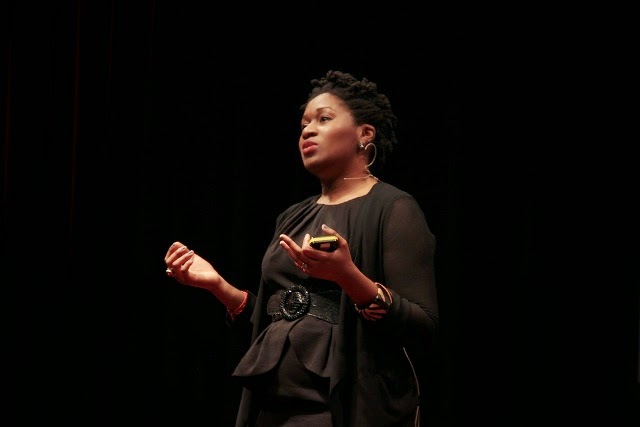Euston, We have a TEDx – Are you coming?
Each December, for the past five years, a sizeable number of African diasporans gather in large numbers to listen to other Africans talk about their mission and their work. The gathering in question is TEDX Euston, an independently organised event that riffs off the main TED event, and similar to its (sort of) parent, TEDX Euston aims to break ground in the way its audience thinks. Particularly the way they think about Africa. Having grown from a small but well-put together event held in a university lecture theatre to an event that occupies The Mermaid Theatre in Blackfriars – one of London’s larger conference venues TEDX Euston is now a firm fixture in London’s Africa calendar. I caught up with Chikwe Ihekweazu, one of the key organisers of the event, and one of the founders for an inside scoop on this year’s event, and the future for TEDx Euston. (Full disclosure: The RAS is one TEDX Euston’s supporters)
We meet in Victoria Station, and in the voluntary spirit that characterises the event, we are meeting in his lunch hour.
Despite its exponential growth, Ihekweazu is quick to dispel any suggestions of TEDx Euston becoming an organisation in its own right, though there is clearly a burning ambition to capitalise on the success of the event. “There’s so much we’d love to do with it – but…it’s an all-volunteer-led event…a huge event on its own…so we have to really choose between delivering a high-quality event, and diluting that and trying to be more”. Ihekweazu says one of his biggest insights from organising the event is what he calls “the confluence between heart and head” and how it finds expression in volunteerism. The event is pulled together by a group of 20 key volunteers that work together round the year to deliver on this one day event.
So even though they’re not planning on becoming an institution, Ihekweazu suggests, they run with the same discipline to deliver one of London’s major annual events for the African diaspora. Where TEDx Euston wants to do more is its demographics; though the event attracts a core audience of young, African professionals mostly between the ages of 30 – 40, the organisers wants the event to also attract more of a diverse global audience that reflects London, at the moment non-Africans make up about 5-10% of attendees, but the audience is growing, reflecting an increasing interest in the continent.
More worrying for this forum showcasing ground-breaking African thinkers, one of the key gripes of some who have attended the event, (and many who haven’t) is that the event is too Nigeria-focused, reflecting the demographics of the organising team and less that of the wider African-diaspora in London. It’s a challenge Chikwe Ihekweazu acknowledges but which he approaches from his experience as an epidemiologist and replies to robustly, ‘If you look at the speakers, pro rata to the population of the continent and how many Africans are actually Nigerians…it’s not actually Nigeria-centric’. But he’s aware the perception is probably more stubbornly persistent than the reality and he adds, ‘Having said that, or goal is obviously to be as broad as possible – this year we’ve made another effort. We have a whole range of speakers from Kenya, Somalia, Zambia – we have our first speaker from Zambia, and three speakers from South Africa”. Among the three speakers from South Africa is Herman Mashaba a black entrepreneur who made his fortune during South Africa’s apartheid era. The Zambian speaker is Catherine Phiri, the media executive who produced Shuga, MTV’s first drama series for Africa, which included a HIV storyline. Health, not surprisingly given the professional background of many of TEDx Euston’s instigators, is a major strand in the event, with three or more speakers working in fields of health advocacy. One speaker, Ihekweazu, who has spent much of the past five years working in South Africa’s health sector, highlights Kemi Akinfaderin-Agarau, who, he says is making sexual health messaging accessible to young people in Nigeria in very innovative ways, and taking on the issue of sexual health which many people are scared of”.
There are also new guests this year speaking on bracingly new themes, including the acclaimed archaeologist Sada Mire, who has begun re-establishing a historical record for Somalia, and asserts quite firmly that cultural heritage is a human right like any other. Asked which speakers, he’s most looking forward to – he is, of course, coy. “You know the great thing about TEDX Euston and how we approach the speakers is that we don’t have a hierarchy in our speakers – we’re quite egalitarian in how we treat them. And we tell them upfront that there’s no keynote speaker, there’s no big and small – by definition we invite people at different points in their own journeys.” Ihekweazu says that in addition to attracting big names like Nigeria’s reformist Minister for the Economy, Ngozi Okonjo-Iweala, this year, they’ve tried to bring surprisingly new and broadly unheard of voices to the TEDX Euston audience. “For the first…we have four speakers that probably have very little name recognition and we’ve made a conscious effort to give the TEDX Euston stage to a group of new voices of the continent that are doing what we think are fascinating work – and you’ll be surprised by what they’ll bring to the TEDX Euston stage”
For more information about the event and how to get tickets, go to www.tedxeuston.com

